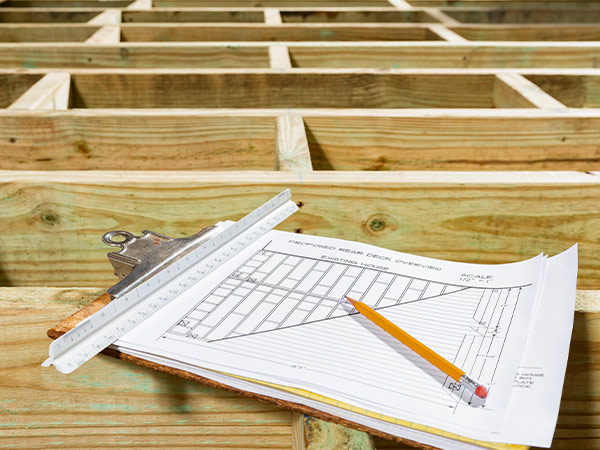

Building Permits Before Your Next Project
You can picture your dream deck—it's beautiful wood with room for your grilling station. You planned it out and you're just itching to start. But before you get started, consider whether you need a building permit. Even though this may well add to the timeline of your project, it could be the necessary first step. Determining if a permit is needed and obtaining one if necessary will certainly give you peace of mind. Before you head over to your McCoy’s for project supplies, make sure you review when and why you might need a building permit.
Building Permits Are More than Just Paperwork
Building permits are a formal way to ask permission to build anything major in your city or county and an agreement by you that your project will be built to code. Permits come with their own processes, and most will require some form of safety inspection along the way. Even though it's your home or property, you must obtain building permits for several reasons.
- The main reason for building permits and the inspection process is to keep everyone safe. Every project should be built according to the International Building Code which is the standard for building safe structures. No deck failures here!
- A code and permit process keeps a record of changes to your home. This process protects you when you sell your home in the future. Improper work can hinder a sale—buyers do not want to move into a home that wasn't built to code.
- The government keeps track of permit applications as an economic indicator. An increased number of building permits could be a good sign for the economy, which is good for us all.
- If the reasons above don’t convince you that building permits are necessary, you can face fines for work completed without the proper permit.
When is A Building Permit Required?
There are so many different types of building or remodeling projects that require permits and so many that don’t, it can be hard to know what you need. A good rule of thumb is any major building, altering, or adding to your home or disrupting any easements (like a sewer line or sidewalk) will most likely require a permit. Cosmetic changes like painting a room, installing new cabinets, or switching up your type of flooring typically will not require a permit.

Projects that Might Require a Permit

- A large deck. Decks that will be your main mode of egress (a builder’s term for how you enter and exit your home) or those that will be attached to your house will most likely need a permit. Some smaller, detached decks may not.
- A shed. If your shed location is near your home or another structure, you will most likely need a permit. This is to help mitigate any potential fire hazard. Some sheds that are off by themselves on large property may not need a permit.
- A fence. There are several factors that could determine if a permit is needed, including changing the height of an existing fence, building a new fence adjacent to government-protected land, or even creating privacy. If you have determined you don’t need a permit, be sure you know the rules of your neighborhood before any fencing is put in. Your neighbors might appreciate a heads up, too.
- Enlarging a closet. This is a big project and requires structural changes. You will need a permit.
- A new front door. If you are just replacing the slab, you may not need a permit. However, if you are redoing the door jamb a permit could be required. If you are widening the doorway, that is a major structural change that will more than likely require a permit.
If you don’t know what is necessary, most cities and counties have websites that make applications easy, or you can call your local building department and request information. Even if you don't need a permit, you should still build your projects to standard building codes for safety. Keep in mind that if you don’t need an official permit, you still need to be aware of your property lines, or any HOA or CCR regulations.
Obtain a Permit and Begin Your Project
After you have determined that you will need a city and/or county permit(s) for your project, either by calling or going online, you will need to fill out the required paperwork clearly with as many details about your specific project as possible. Usually, a fee is required for a permit, so remember to include it in your project budget.
5 Permit Process Tips
- Wait to start work on your project until you receive your permit. Any work done before you have been granted a permit can be subject to a fine.
- Start and complete your project in a timely fashion. Permits may have a time window for starting and completing your project.
- Once you obtain the permit, do not cover or build onto any work until an inspector approves it. This applies even if it is just the task of filling in deck footings.
- Cities adopt the International Building Codes at different rates and include their own changes and additions. Be sure you know which version of the building code you are building to.
- You can do some large building projects with an owner/builder permit, but you may need a licensed professional for others.
Building permits protect you and your family’s safety, which is why getting a permit before you start work is imperative. But, after you have your plan and permission, stop by your local McCoy’s for your project supplies. We can’t wait to know what you’re building!
